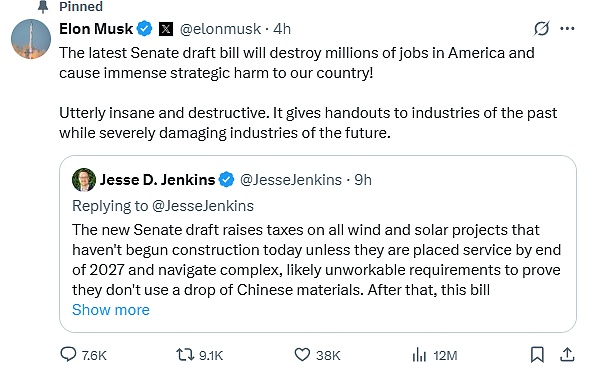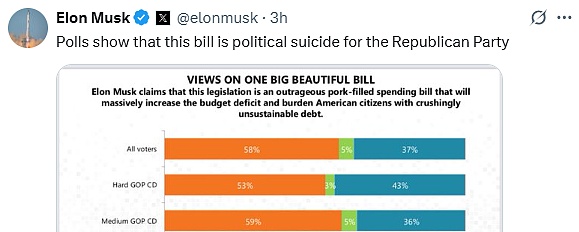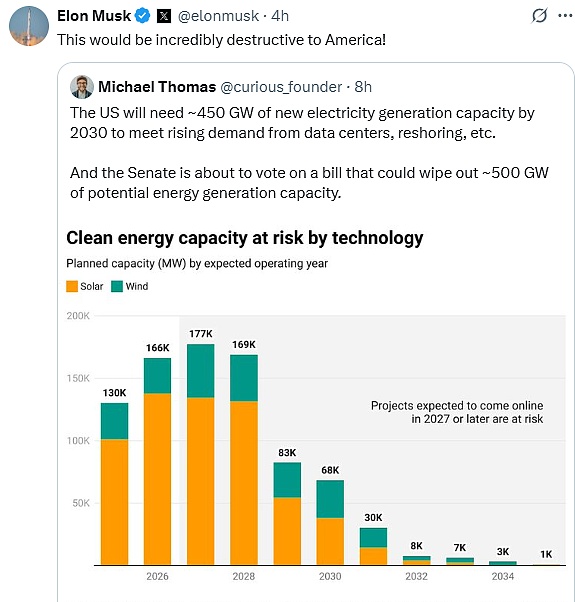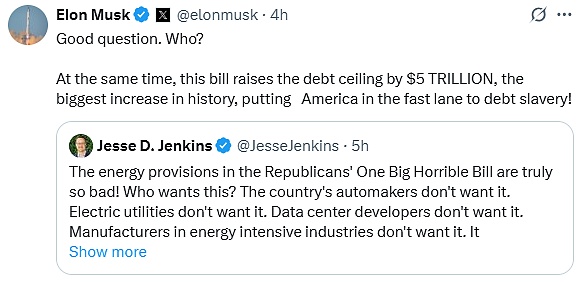The U.S. Congress is accelerating the "Big Beautiful Bill" pushed by Trump, which is the core puzzle of Trump's economic agenda.
On Sunday, June 29, after a fierce tug of war, the U.S. Senate passed the procedural vote of the "Big Beautiful Bill" pushed by Trump with 51 votes in favor and 49 votes against, and officially entered the debate stage.
This vote is not the final passage of the bill itself, but a procedural step that allows the bill to enter the final debate stage, which is a key test point in the legislative process. The Republican majority leader hopes to send the bill to the president's desk before the July 4 Independence Day holiday.
The vote lasted nearly four hours, and the process was very see-saw. All Democrats and two Republicans voted against the bill, trying to prevent it from moving forward.
The interesting behind-the-scenes detailis that in the end, three Republican senators who had insisted on opposing the bill finally gave in and voted in favor of it, which shows that there is no ironclad unity within the party. The extra "change of vote" just pushed the number of votes in favor to 51, so that Vice President Vance did not have to come forward to cast a tie-breaking vote.
But the uncertainty of the vote and the last-minute bargaining in the past few hours also highlighted that the real difficulties are still ahead. Because in order to pass the final vote smoothly,Senate Republicans have to continue to "fine-tune" the bill in order to get the 50 votes needed to pass the Senate.
On the same day, Musk slammed the Trump administration's latest trillion-dollar tax reform bill. He said on social media that cutting subsidies for electric vehicles and other clean energy would be extremely destructive to the United States:
The latest Senate draft bill will destroy millions of American jobs and cause great strategic damage to our country! This is simply crazy and destructive. It gives alms to past industries while seriously damaging future industries.

Polls show that this bill is political suicide for the Republican Party.

This will be extremely devastating for the United States!

Good question. Who? At the same time, the bill raised the debt ceiling by $5 trillion, a record high,putting the United States on the fast track to debt slavery!

Democrats use tactics to delay
This bill cannot be formally passed in the Senate until the final vote. Democrats intend to delay time by reading the full text aloud, and may push the final vote to next Monday.
Democratic Minority Leader Schumer said he would ask for the full text of the 940-page bill to be read out in public during the Senate debate. Commentators said that this is a procedural tactic to delay as much time as possible.
Schumer said on X on Saturday Eastern Time that he was ready to stay up all night to fight:
"If the entire bill is to be read, we will stay here all night."
A few people's backlash may cause the entire bill to fail.
Even if the Senate ultimately passes it, it will have to go back to the House of Representatives for another vote.
The House of Representatives passed its own version by a narrow margin just last month.
Some Republican members of the House of Representatives have publicly stated that they cannot accept the drastic cuts to Medicaid in the Senate version, so it will be difficult for the House of Representatives to vote.
This means that both Senate Majority Leader Thune and House Speaker Mike Johnson only hold a slim majority of seats. If the bill is to be passed by relying on party votes, they can only withstand a very small number of Republicans defecting, and a few defections may cause the entire bill to fail.
The White House issued a statement on Saturday Eastern Time:
"President Trump is committed to fulfilling his promises, and failure to pass this bill will be the greatest betrayal of the voters."
The new version will cut green energy tax credits and subsidies
According to a previous article in Wall Street Journal, in order to win support from different factions within the party, the Senate Republican leadership made a number of compromises in the latest version of the bill, appeasing moderates on Medicaid cuts and conservatives on renewable energy policies.
In terms of Medicaid cuts, in order to appease moderates, the bill will postpone the full implementation of the 3.5% cap on the "medical provider tax" from 2031 to 2032, and will be implemented in stages from 2028. In addition, a $25 billion rural hospital fund will be established to cushion the impact on medical care in remote areas.
In terms of renewable energy policies, in order to win the support of conservatives, the new version has raised the threshold for subsidies. Wind and solar projects must be put into operation before the end of 2027 to enjoy subsidies. Previously, it was only required to start construction before that. At the same time, the original proposal was to end most electric vehicle subsidies at the end of this year, but the new version has now changed to cancel subsidies ahead of schedule on September 30, including discounts for used and commercial electric vehicles.
In addition, in order to avoid the risk of government default in August, the bill will also increase the US debt ceiling by $5 trillion. The bill also deletes Section 899 "retaliatory taxation" that has caused concerns on Wall Street.
 Miyuki
Miyuki
 Miyuki
Miyuki Weiliang
Weiliang Weatherly
Weatherly Alex
Alex Miyuki
Miyuki Weiliang
Weiliang Alex
Alex Catherine
Catherine Anais
Anais Miyuki
Miyuki